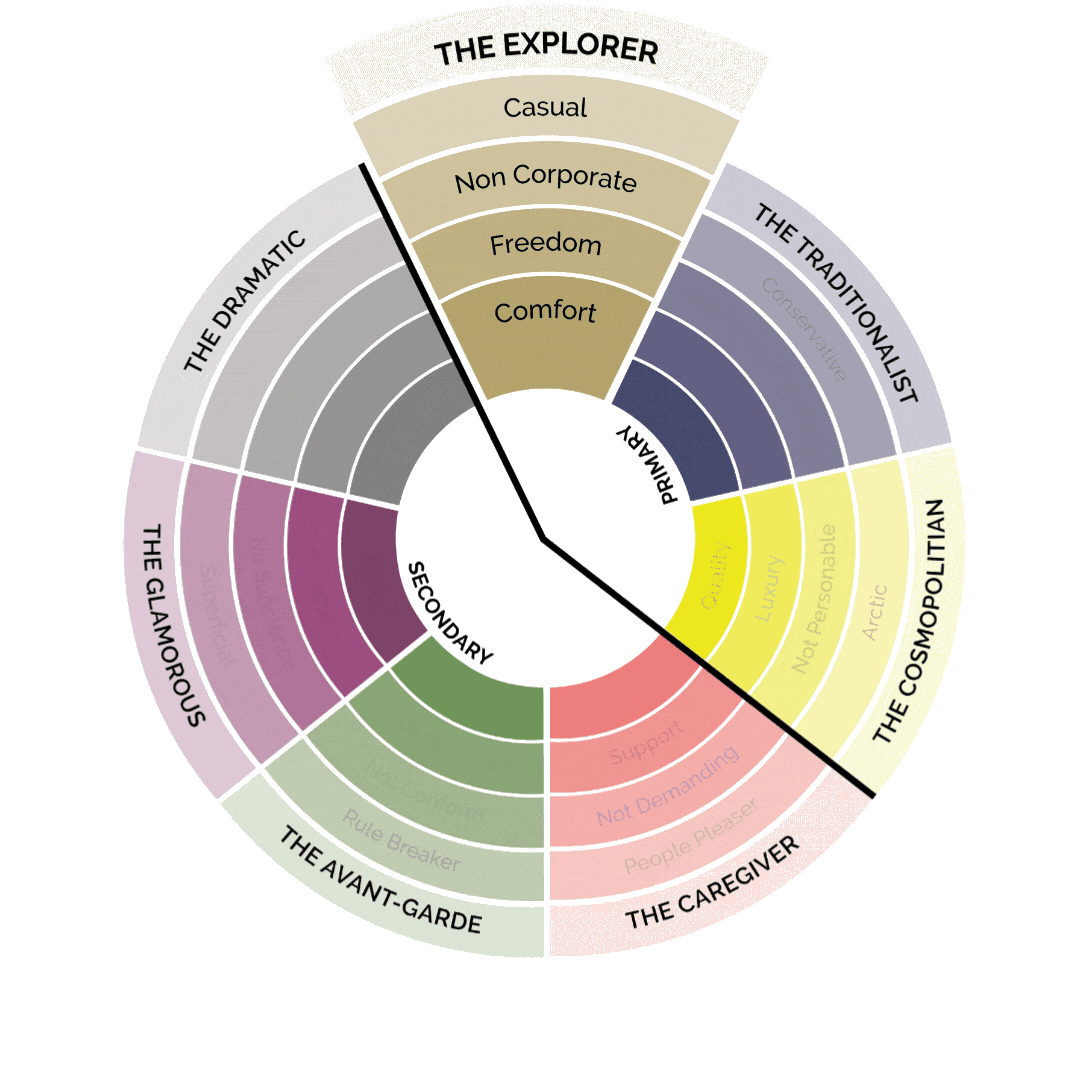Why Your Mom Was Right About the Importance of Names
Dear [Fill in your name],
Names. We all have one, and we use them every day, often without giving them a second thought. But what if I told you that names are more than just labels? They are, in fact, powerful psychological tools that can shape our identity, influence our interactions, and even dictate our future. Intrigued? Let’s dive into the fascinating world of names and explore why getting them right in introductions is not just polite—it’s crucial.
A name is the cornerstone of our social identity, the first gift we receive at birth, and often the last thing that remains after we’re gone. It’s the word that represents us in the grand narrative of life. When you introduce yourself, you’re not just sharing a name; you’re offering a gateway into your world.
Remembering someone else’s name is not just a demonstration of good manners; it’s a testament to your respect for their identity and your commitment to forging a genuine connection. It’s the first stitch in the fabric of trust, the key to unlocking doors to meaningful conversations, and the catalyst for building lasting relations.
The Dopamine Effect: The Joy of Hearing Your Own Name
Hearing your own name triggers a unique response in the brain, releasing a small but significant amount of dopamine, the “feel-good” neurotransmitter. This phenomenon sheds light on the power of personalization and why it’s not just polite but also incredibly effective to use someone’s name when engaging in a conversation. The act of personalizing interactions by addressing someone by their name goes beyond mere courtesy—it creates a positive emotional response, laying the foundation for a fruitful and meaningful relationship.
The Dopamine Effect underscores why personalized marketing strategies are so effective. When you receive an email or see an advertisement that includes your name, it immediately grabs your attention in a sea of generic content. Similarly, in introductions, addressing the other person by their name demonstrates that you were not just present physically but also mentally. It’s a subtle yet profound way to convey your genuine interest in the interaction.
The Power of Personalization:
- Engagement: Using names increases the level of engagement in a conversation, making the interaction more memorable and impactful.
- Reciprocity: It encourages a more open and reciprocal exchange of information, as it signals respect and attentiveness.
- Trust: It fosters a sense of trust and intimacy, even in brief interactions. Trust is the bedrock of meaningful relationships, and using someone’s name can set the stage for trust to flourish.
The Trust Factor: Why Names Are a Social Contract
Names are more than just words; they are social contracts woven into the fabric of human interaction. When someone shares their name with you, they are entrusting you with a part of their identity. It’s an unspoken agreement, a gesture of goodwill, and a foundation upon which the edifice of trust is built. Getting a name right isn’t merely a matter of etiquette; it’s a declaration that you respect and value that trust, and you are committed to honoring it.
The Social Contract in Action:
- In Business: In a corporate setting, getting names right can be the difference between sealing a lucrative deal and losing a potential client. When you remember and correctly pronounce a client’s name, it signals that you’ve invested time and effort in understanding their identity, their needs, and their goals. It conveys that you view them as a unique individual and not just another face in the crowd.
- In Personal Relationships: In friendships and romantic relationships, consistently remembering names can be a powerful bond-strengthening tool. It’s an acknowledgment that you cherish the person’s presence in your life and that their name is not just a string of letters but a part of your shared narrative.
The Cognitive Load: Why We Forget Names
We’ve all been there. You meet someone new, they introduce themselves, and within seconds, their name has vanished from your memory. It’s not that you weren’t paying attention; it’s that your brain was overloaded with information. When you meet someone for the first time, your brain is a bustling control center processing a myriad of stimuli—everything from their appearance, behavior, verbal and non-verbal communication to the very name they share. This intricate ballet of sensory input can create a cognitive overload, making it challenging to remember names amidst the whirlwind of initial impressions.
In essence, your brain is like a juggler trying to keep multiple balls in the air simultaneously. It juggles visual cues, auditory signals, and the intricacies of social interaction. The introduction of a name becomes just one more ball in the mix. However, understanding this cognitive phenomenon isn’t merely an academic exercise; it’s a practical insight that can empower you to develop strategies to overcome the challenge of name recall.
Tips for Reducing Cognitive Load:
- Focus: Give your undivided attention when someone is introducing themselves. Pause and let their name register in your mind.
- Repeat: Actively engage by saying the person’s name back to them during the conversation. Repetition reinforces memory.
- Associate: Link the name with a familiar image or concept. Create mental connections that make the name easier to recall.
The Awkward Dance: The Social Cost of Getting It Wrong
We’ve all felt the cringe-worthy moment when someone gets our name wrong. It’s more than just awkward; it’s uncomfortable and can even be perceived as disrespectful or insulting. The social cost of such mistakes is remarkably high, particularly in professional settings where first impressions are paramount. Whether it’s a job interview, a networking event, or a crucial business meeting, getting names right is non-negotiable.
The Price of a Mistake:
- Reputation: Your professional reputation is a delicate entity, easily tarnished by even a single name-related blunder. Colleagues, clients, or superiors may question your attention to detail and professionalism.
- Opportunities: The world of networking is unforgiving when it comes to name errors. A misstep can cost you valuable networking opportunities and potentially lucrative business deals.
- Self-Esteem: It’s not just about you. For the person whose name you forgot or mispronounced, it can be a blow to their self-esteem. It sends a message that their presence was not impactful enough for you to remember their name, leading to feelings of insignificance.
Names Around the World: A Cultural Kaleidoscope
The world is a diverse tapestry of cultures, each with its own set of customs and conventions regarding names. Understanding and respecting these cultural nuances is not just a sign of cultural competency; it’s a mark of respect. Whether you’re working with international clients, traveling for business, or simply expanding your global mindset, knowing how to navigate the etiquette of names is essential.
Navigating Cross-Cultural Name Etiquette:
- Global Business Relationships: Gain insights into the role of names in international business and diplomacy.
- Avoiding Cultural Missteps: Learn about common cultural naming conventions and how to avoid unintentional disrespect.
- Building Bridges: Discover how showing respect for local naming customs can help you bridge cultural divides and foster international relationships.
Lost in Translation: The Perils and Pitfalls of Cross-Cultural Naming
In a globalized world, the collision of names from different languages and cultures is inevitable. However, handling these linguistic intersections with grace and sensitivity is essential. From mispronunciations to translations gone awry, the perils and pitfalls of cross-cultural naming can be a minefield.
- Pronunciation Challenges: Understand the difficulties of correctly pronouncing names from diverse linguistic backgrounds.
- Translation Mishaps: Learn about the often humorous and sometimes cringe-worthy translation mishaps that occur when names cross cultural boundaries.
- Respectful Engagement: Discover strategies for engaging with names from various cultures respectfully and considerately.
Mastering the Art of Names: From Recall to Pronunciation, Asking to Apologizing
Getting names right, whether it’s recalling them effortlessly, pronouncing them with precision, or gracefully asking when you’ve forgotten, reflects your commitment to building meaningful relationships. And when mistakes occur, as they inevitably do, the way you handle them can strengthen connections rather than erode them.
How to Remember Names Right
- Repetition: Repeat the person’s name during the conversation to reinforce memory.
- Word Association: Create mental associations between the name and a distinctive feature or characteristic of the person.
- Create visual images: Visualize the person’s name as a picture or object.
- Acronyms and rhymes: Form acronyms or rhyming phrases using the name to aid recall.
How to Pronounce Names Right
- Ask for pronunciation: Politely ask the person to pronounce their name for you, showing your genuine interest in getting it right.
- Listen attentively: Pay close attention when they pronounce their name, and mimic the pronunciation as closely as possible.
- Use a friendly tone: Approach the request with a warm and respectful demeanor.
- Express your intent: Explain that you want to ensure you pronounce their name correctly because it matters to you.
How to Ask for Someone’s Name:
- Be friendly: Say, “I’m sorry, I didn’t quite catch your name. Would you mind repeating it?”
- Offer your own name first as a friendly gesture before asking for theirs.
- Normalize forgetfulness: Express that it’s common to forget names in the fast-paced world we live in, making it less awkward.
- Use humor: Lightly humorize the situation to ease tension, but ensure it’s respectful.
How to Handle Name Mistakes
- Apologize promptly: Acknowledge the mistake and offer a sincere apology.
- Use humor (when appropriate): Lightly humorize the situation to diffuse tension.
- Avoid over-apologizing: A sincere apology is essential, but excessive apologies can make the situation more awkward.
Remember, it’s not just about the words we use; it’s about the respect and genuine interest we convey through them. Addressing someone by their name isn’t a mere formality; it’s a tribute to their identity and an invitation to a shared narrative. It’s a reminder that we are all unique threads in the tapestry of life, and getting it right shows that we value and cherish those threads.
So, embrace the power of names. Use them wisely, remember them warmly, and handle them with care. And if you’re looking to make an unforgettable first impression, dive into another blog post, where I reveal the secrets to crafting a memorable introduction that will leave a lasting mark.
REMEMBERING NAMES IN A NUTSHELL

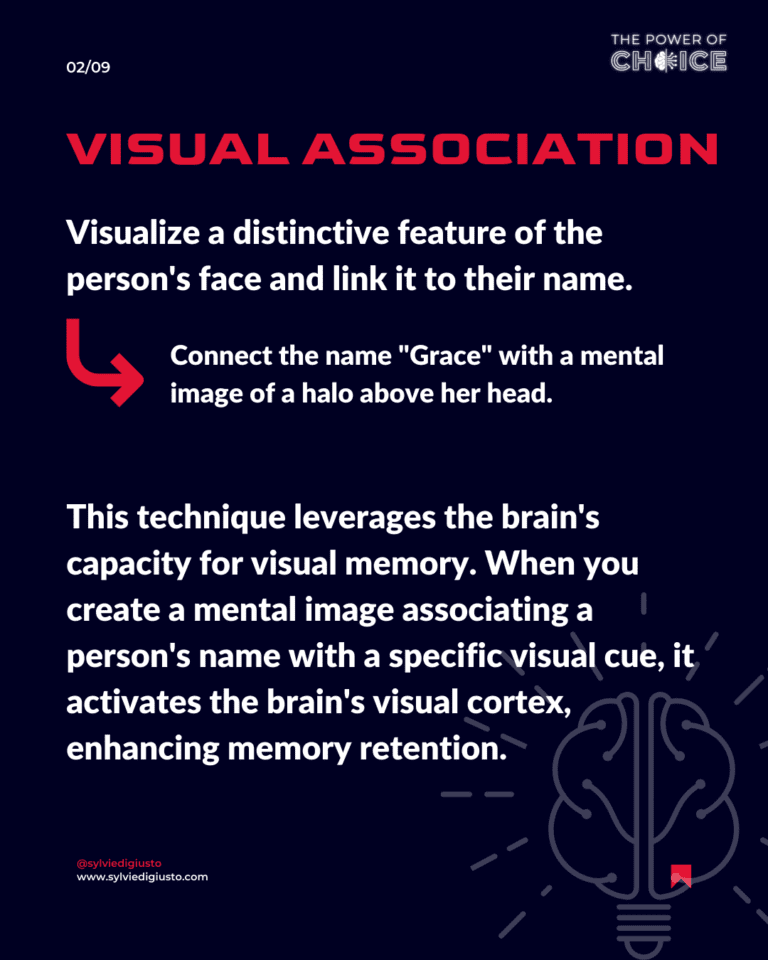
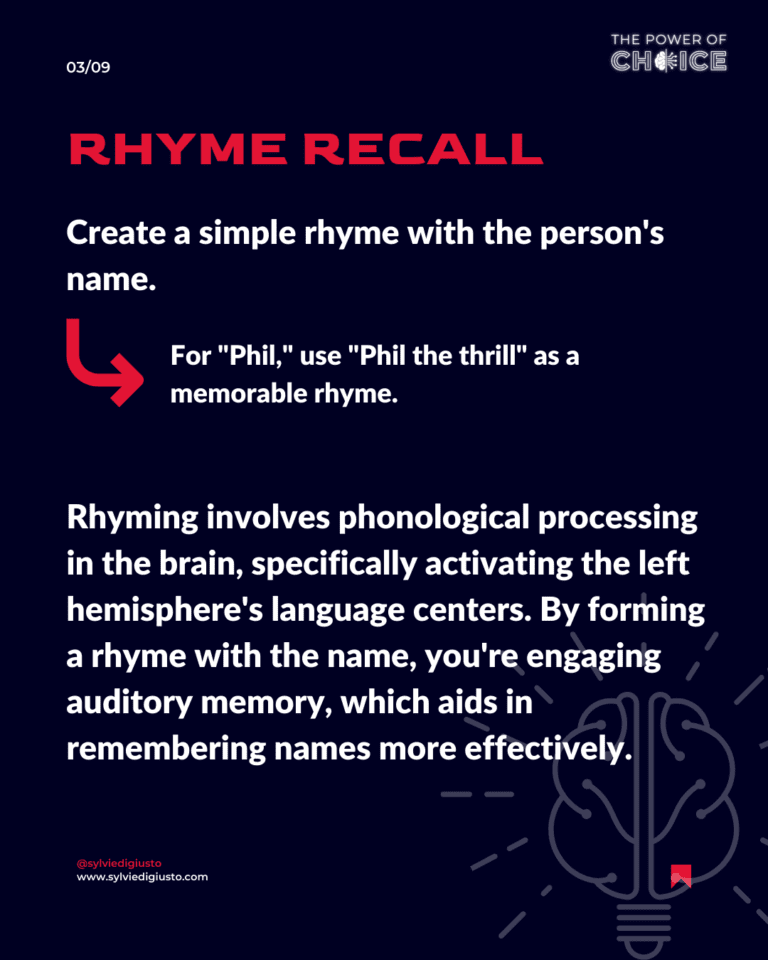
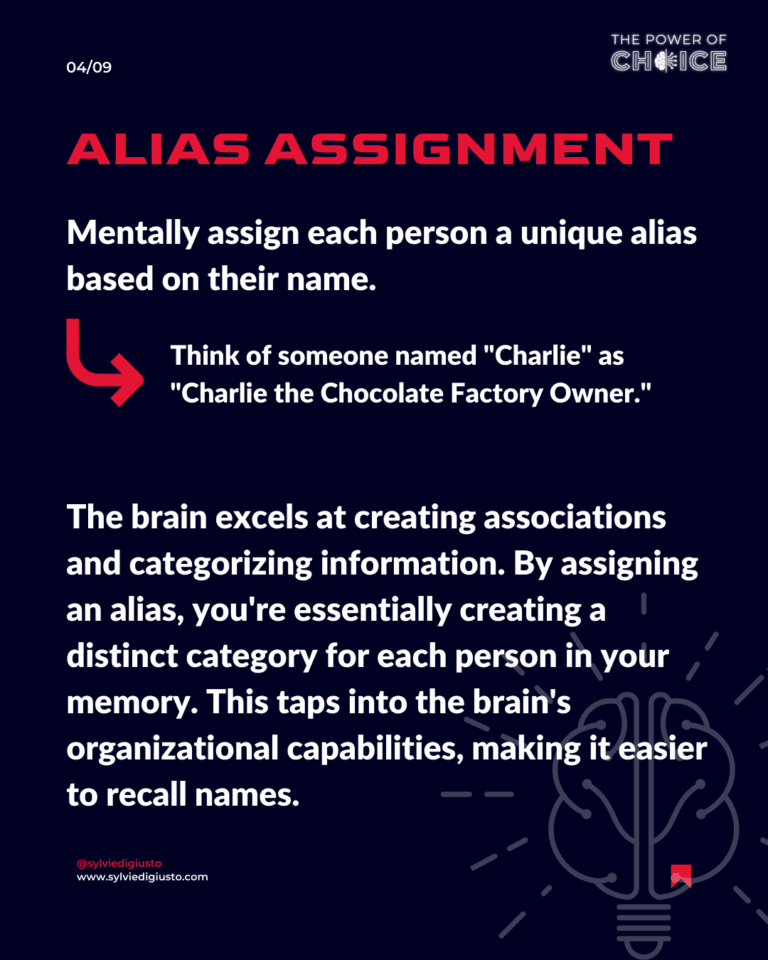
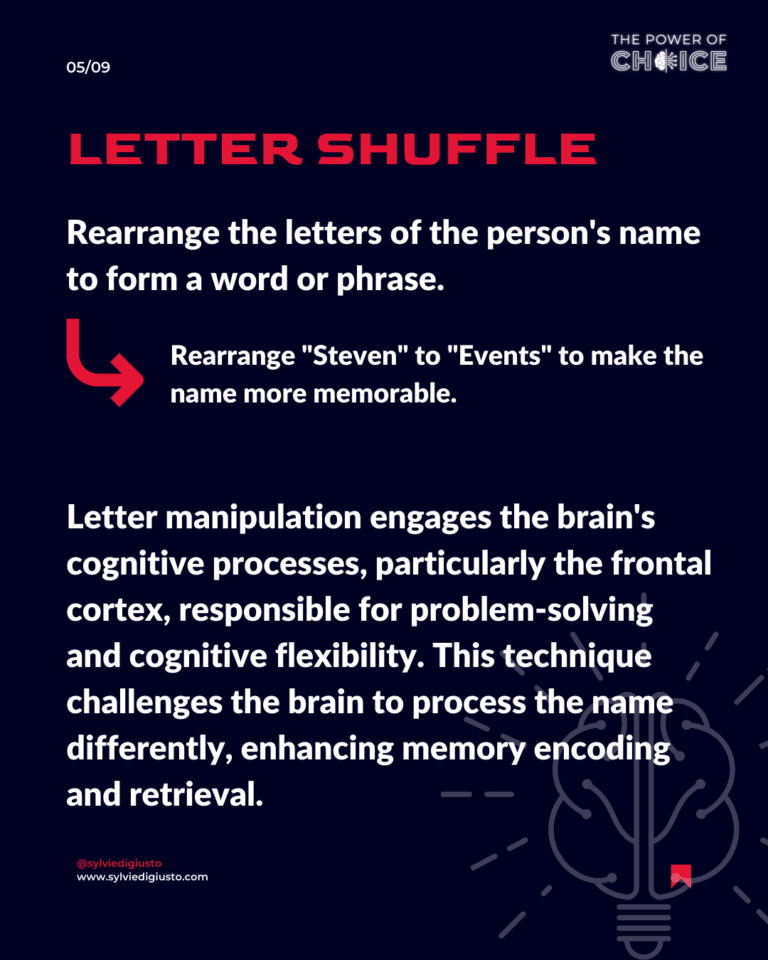
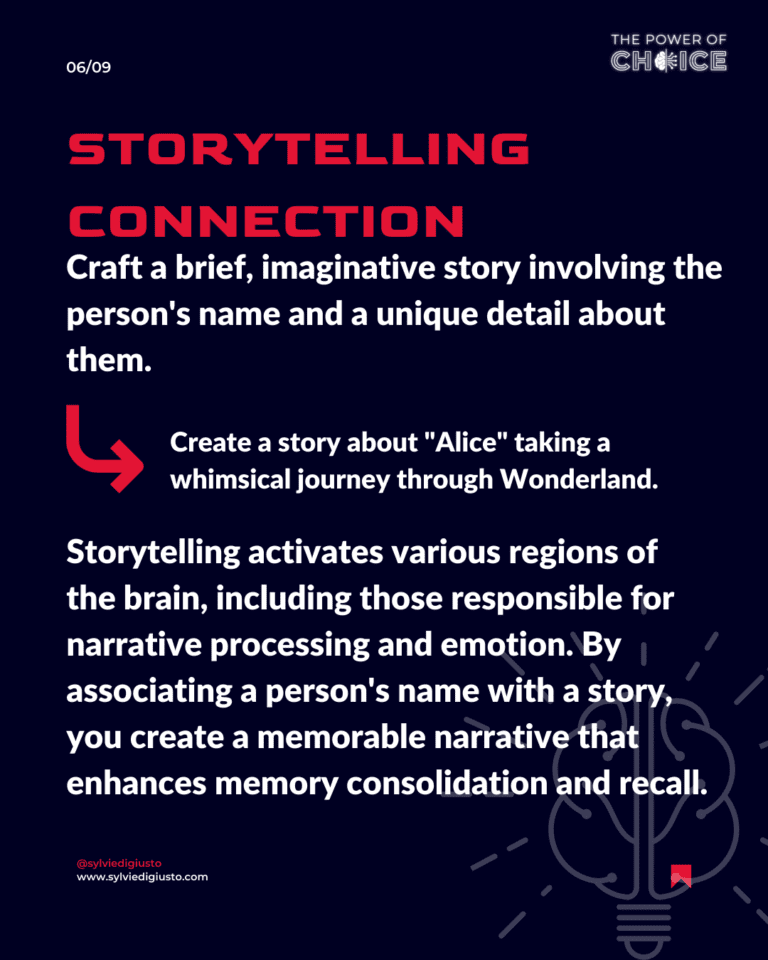
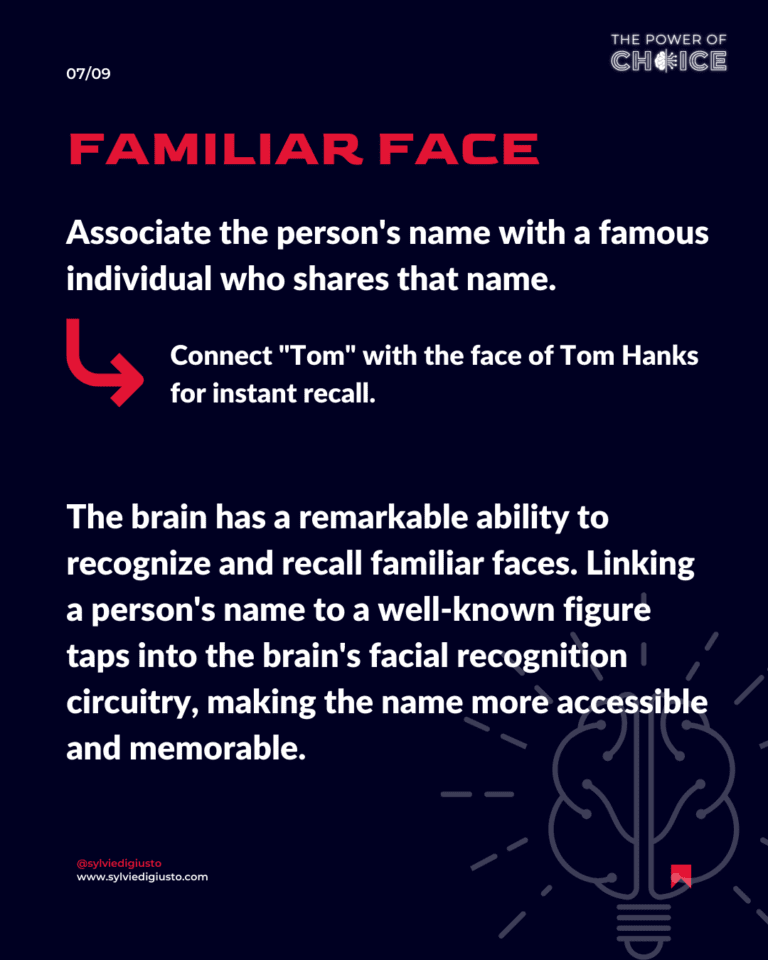
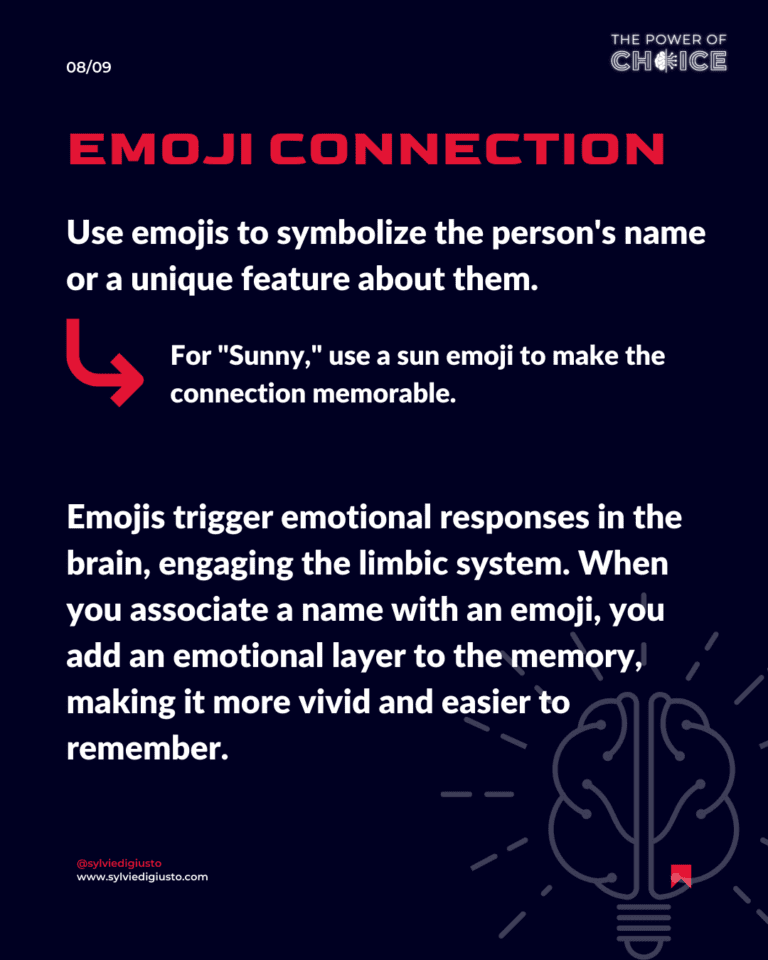

PS : Intéressé par plus de contenu comme celui-ci ? Ne manquez pas d'aller sur Suivez-moi sur Instagram. C'est là que je visualise et publie mes pensées quotidiennement. J'espère vous y voir.




